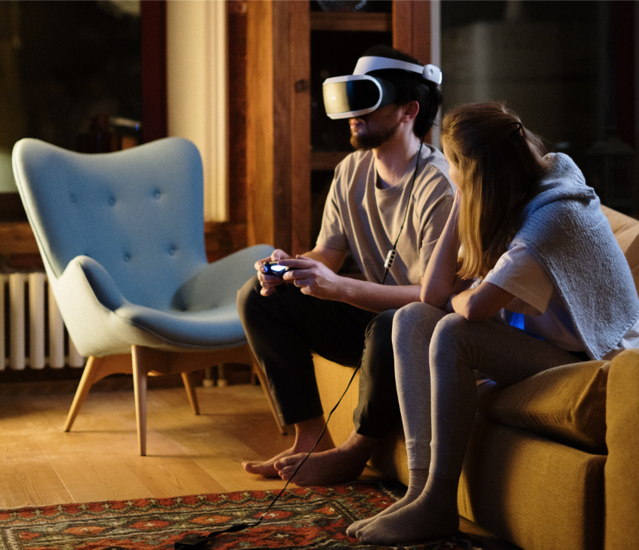Empathy
Can Computers Help Us to Be More Empathic?
New research investigates the power of virtual reality.
Posted August 6, 2020 Reviewed by Matt Huston
There’s very little work technology might not one day be able to do on our behalf. It’ll probably cook for us, write for us, and maybe even govern us. But there’s one thing that technology may not be able to do for us – help us to be more empathic.
In 2006, when then-senator Barack Obama proclaimed that “we have an empathy deficit,” he believed that human empathy was the key that would unlock a more understanding society. Parents, teachers and community leaders have expounded the virtues of empathy and yet researchers have found evidence that empathy is sharply declining in recent generations. So far, efforts to use modern technology to reverse this trend have come up short.
Empathy, it turns out, is not a simple thing. Empathy can motivate us to care for others but it can also cause distress and leave us with a diminished capacity to help because we are so emotionally drained ourselves. Consider, for example, the rapid rush of empathy you suddenly feel when a refugee child is depicted on the news. A palpable feeling of discomfort washes over you, a feeling that psychologists call emotional empathy.
The rush of emotional empathy may, in some cases, prompt you to call your senator or donate to charity, but it may also encourage you to look away. Once you turn your head, that empathic feeling is likely to fade almost as rapidly as it was elicited.
The transitory and distressing nature of emotional empathy warrants a healthy dose of skepticism towards any quick-fix empathy solution aiming to virtually push our emotional buttons. In a viral TED talk on the topic, Chris Milk described VR as the “ultimate empathy machine.” Chris might have been speaking in hyperbole, but in 2016, VR giant Oculus released their “VR for Good” initiative to incentivize designers to create prosocial content. HTC VIVE, not to be outdone by their leading competitor, announced their $10 million “VR for Impact” program in 2017. Since then, many national and international charities have collaborated with technology companies to use VR in their fundraising campaigns. In the last few years, these include Amnesty International, International Rescue Committee, Médecins Sans Frontières, and UNICEF USA.
The power of VR is assumed to lie in its ability to remove the burden of empathizing. No longer do we have to try to imagine what it is like for another person, in another place—we are virtually there. Tremendous advances in computer technology over the last decade have made it possible to achieve hyper-realistic simulations. Designers have made use of powerful graphics, motion-sensing technologies, and surround sound systems to place viewers in realistic environments and situations that they might find hard to imagine, such as refugee camps, homeless shelters, or the experience of racial discrimination.
By making empathy easier, it is hoped that VR can create empathy in people who are not otherwise motivated or able to empathize. However, by allowing such technology to do the work for us, we may be losing some of our own empathy skills.

In addition to emotional empathy, humans are capable of more a deliberate type of empathy called cognitive empathy. Cognitive empathy involves understanding what another person is experiencing without necessarily having any emotional response. It’s a capacity we value in our physicians and first responders, whom we want to care for us but not become emotionally distraught themselves. Unlike its emotional counterpart, cognitive empathy requires effort: We must consciously try to take someone else’s perspective. Cognitive empathy leads us to care without the negative side effects of emotional distress, which could make it a more reliable solution to our empathy deficit.
Unfortunately, the effort involved in cognitive empathy means that people prefer to avoid it if possible. But with the right encouragement, putting effort into understanding others will pay off. Neuroscientists have shown that the more difficult it is to predict another person’s intentions, the more active the brain areas involved in cognitive empathy become. Just as your gym trainer keeps telling you, no pain, no gain.
Given the importance of mental effort for improving cognitive empathy, delegating this effort to a machine seems unlikely to improve cognitive empathy. My colleagues and I recently found evidence for this limitation of VR in a meta-analysis that combined the results from 43 different research studies. We found that while virtual reality can improve emotional empathy, critically, it does not seem to improve cognitive empathy. Trying to improve cognitive empathy using virtual reality may be like trying to learn how to drive by taking a taxi: You’ll get where you want to go today, but you’ll have the same problem tomorrow.
That’s not to say that VR doesn’t have its uses for social good. Fundraising campaigns may find that emotional empathy is more than sufficient for their purposes, assuming they can capitalize on the rush of emotion with a well-placed donation bucket or web link. However, those interested in creating long-lasting improvements in empathy may want to consider interventions that encourage people to challenge their cognitive empathy skills by getting them to decipher what other people are thinking or feeling in complex, ambiguous, and difficult social situations.
There are many reasons that empathy may be declining in our youngest generations, including changes in parenting and increases in bullying. But perhaps more recent generations have simply not had the opportunity to practice empathy to the extent their forefathers did. Today we are bombarded with explicit, graphic content that arouses our empathy automatically and requires relatively little effort on our part to decide how we should respond. Suffering is brought into our homes on our TV screens and taken with us on our commute via our smartphones.
It might be reasonable to assume we can simply continue to arouse empathy through more graphic and more immersive technologies. Perhaps we don’t need to learn to drive when Uber can provide a car in minutes? Without fostering our own empathy skills, however, we could find ourselves limited to empathizing with only those presented to us in high-definition images with surround-sound technology.
One of the great benefits of empathy is that it allows us to care for people whom we cannot see, but can imagine based on our shared humanity. It is important for us not to get lazy. After all, human brains are the ultimate empathy machines, and we should tend to them better.




